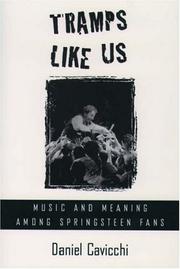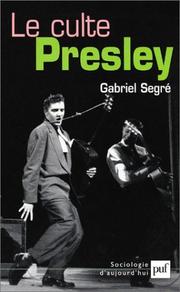| Listing 1 - 10 of 10 |
Sort by
|
Book
ISBN: 1350291560 1350291579 9781350291560 9781350291577 Year: 2023 Publisher: London: Bloomsbury academic,
Abstract | Keywords | Export | Availability | Bookmark
 Loading...
Loading...Choose an application
- Reference Manager
- EndNote
- RefWorks (Direct export to RefWorks)
"A bottom-up study of The Beatles' fan base and fan culture to explore the impact upon American society, popular culture and politics in the 1960s"--
Book
ISBN: 2916560092 9782916560090 Year: 2007 Publisher: Boulogne-Billancourt: Autour du Livre,
Abstract | Keywords | Export | Availability | Bookmark
 Loading...
Loading...Choose an application
- Reference Manager
- EndNote
- RefWorks (Direct export to RefWorks)
Dans l'après-midi du 16 août 1977, Elvis Presley est retrouvé inanimé dans sa salle de bain. Il décède quelque temps plus tard au Baptist Memorial Hospital de Memphis, âgé de 42 ans. La nouvelle fait instantanément le tour du monde. Les radios modifient leur programmation. Les journaux changent leur une. Soixante-quinze mille personnes se regroupent devant les grilles de Graceland, la propriété du chanteur, afin de lui rendre un ultime hommage. C'est, semble-t-il, la fin d'une vie, d'une oeuvre, d'une histoire, d'un phénomène qui ont bouleversé la musique et la culture populaire. La fin ? Pas tout à fait. Car Elvis Presley va renaître, devenir l'un des plus grands mythes du vingtième siècle et l'objet d'un culte croissant. Son succès posthume est retentissant. Elvis renaît, plus complexe, plus grand, plus fort, plus adulé. Il vend année après année toujours davantage de disques et établit aujourd'hui encore de nouveaux records de recettes. Pourquoi, une fois mort, n'est-il donc pas progressivement tombé dans l'oubli qui guette les gloires disparues ? Pourquoi et comment est-il devenu ce personnage omniprésent, régnant au panthéon des plus grandes figures du siècle ? Pour répondre à ces questions, le sociologue Gabriel Segré, spécialiste du « culte Presley », dissèque la façon dont a été élaborée la postérité du King, montre comment s'est construit et développé son mythe, comment est né et a grandi le culte - souvent empreint d'une grande religiosité - qui lui est voué par des fans et fidèles toujours plus nombreux. Il permet de comprendre pourquoi il est finalement permis aujourd'hui d'affirmer : ELVIS EST VIVANT !
Rock music fans --- Rock music --- Presley, Elvis, - 1935-1977
Book
ISBN: 1839981342 1839981369 1839981334 1839981350 Year: 2022 Publisher: London : Anthem Press,
Abstract | Keywords | Export | Availability | Bookmark
 Loading...
Loading...Choose an application
- Reference Manager
- EndNote
- RefWorks (Direct export to RefWorks)
This book offers a sociological study of gender regarding women in the heavy metal subculture. Relying on interviews with fans, women have made progress in the metal world, although gendered conditions also continue to exist. Heavy metal feminism is a process in becoming, but not yet an accomplished reality.
Heavy metal (Music) --- Women rock music fans. --- Women rock musicians. --- Social aspects. --- Rock musicians --- Women musicians --- Rock music fans --- Metal (Music) --- Rock music
Book
ISBN: 9780571238545 0571238548 Year: 2010 Publisher: London : Faber and Faber,
Abstract | Keywords | Export | Availability | Bookmark
 Loading...
Loading...Choose an application
- Reference Manager
- EndNote
- RefWorks (Direct export to RefWorks)
Biografie van Syd Barrett, stichtend lid van de psychedelische band Pink Floyd.
Lyricists --- Rock music fans --- Rock musicians --- Barrett, Syd. --- Pink Floyd (Musical group).

ISBN: 9786610471102 0198029055 1282384384 1280471107 9786612384387 1602563276 9781602563278 9780198029052 9780195118339 0195118332 9780195125641 0195125649 0195118332 0195125649 0197729487 0190284323 Year: 2023 Publisher: New York ; Oxford University Press,
Abstract | Keywords | Export | Availability | Bookmark
 Loading...
Loading...Choose an application
- Reference Manager
- EndNote
- RefWorks (Direct export to RefWorks)
Based on three years of ethnographic research with fans, and informed by the author's own experiences, this is an interdisciplinary study of the ways in which ordinary people form sustained attachments to Bruce Springsteen and his music.
Rock music fans. --- Rock music --- Popular music fans --- Fans --- Springsteen, Bruce --- Appreciation. --- Springsteen, Bruce Frederick Joseph, --- Springsteen, Bruce, --- Springsteen, Bruce.

ISSN: 07680503 ISBN: 2130530702 9782130530701 Year: 2003 Publisher: Paris : Presses universitaires de France,
Abstract | Keywords | Export | Availability | Bookmark
 Loading...
Loading...Choose an application
- Reference Manager
- EndNote
- RefWorks (Direct export to RefWorks)
Rock music fans --- Popular culture --- Rock (Musique) --- Culture populaire --- Fans --- Presley, Elvis, --- Popular culture. --- Popular music --- Music fans --- Popular music fans --- Rock music --- Social aspects --- Appreciation --- Popular music - Social aspects --- Rock music - Social aspects --- Presley, Elvis, - 1935-1977 --- Presley, Elvis, - 1935-1977 - Appreciation

ISBN: 1280326220 0203181530 113489919X 9780203181539 9786610326228 6610326223 9780415078207 0415078202 9780415078214 0415078210 0415078202 0415078210 9781280326226 9781134899197 9781134899142 1134899149 9781134899180 1134899181 Year: 1992 Publisher: London New York Routledge
Abstract | Keywords | Export | Availability | Bookmark
 Loading...
Loading...Choose an application
- Reference Manager
- EndNote
- RefWorks (Direct export to RefWorks)
First published in 1992. Routledge is an imprint of Taylor & Francis, an informa company.
Fans (Persons) --- Television viewers --- Groupies --- Popular culture --- Psychology. --- Audiences, Television --- Television audiences --- Television fans --- Television watchers --- Viewers, Television --- Aficionados --- Devotees --- Enthusiasts (Fans) --- Supporters (Persons) --- Rock music fans --- Youth --- Mass media --- Persons --- Hobbyists --- Audiences --- Psychology --- Fans (Persons) - United States - Psychology --- Television viewers - United States - Psychology --- Groupies - United States - Psychology --- Popular culture - United States

ISBN: 0313305692 0313003424 9780313003424 9780313305696 9798400696473 Year: 1999 Publisher: Westport, Conn. Greenwood Press
Abstract | Keywords | Export | Availability | Bookmark
 Loading...
Loading...Choose an application
- Reference Manager
- EndNote
- RefWorks (Direct export to RefWorks)
Rock music --- History and criticism --- Grateful Dead (Musical group) --- Deadheads (Music fans) --- Dead Heads --- Grateful Dead fans --- Rock music fans --- History and criticism. --- Dead (Musical group) --- The Grateful Dead (Musical group) --- The Dead (Musical group) --- Warlocks (Rock group : San Francisco, Calif.)
Book
ISBN: 1477323333 Year: 2021 Publisher: Austin : University of Texas Press,
Abstract | Keywords | Export | Availability | Bookmark
 Loading...
Loading...Choose an application
- Reference Manager
- EndNote
- RefWorks (Direct export to RefWorks)
Vocals tinged with pain and desperation. The deep thuds of an upright bass. Women with short bangs and men in cuffed jeans. These elements and others are the unmistakable signatures of rockabilly, a musical genre normally associated with white male musicians of the 1950s. But in Los Angeles today, rockabilly's primary producers and consumers are Latinos and Latinas. Why are these "Razabillies" partaking in a visibly "un-Latino" subculture that's thought of as a white person's fixation everywhere else? As a Los Angeles Rockabilly insider, Nicholas F. Centino is the right person to answer this question. Pairing a decade of participant observation with interviews and historical research, Centino explores the reasons behind a Rockabilly renaissance in 1990s Los Angeles and demonstrates how, as a form of working-class leisure, this scene provides Razabillies with spaces of respite and conviviality within the alienating landscape of the urban metropolis. A nuanced account revealing how and why Los Angeles Latinas/os have turned to and transformed the music and aesthetic style of 1950s rockabilly, Razabilly offers rare insight into this musical subculture, its place in rock and roll history, and its passionate practitioners.
Hispanic Americans --- Mexican Americans --- Retro (Style) in popular music. --- Rock music fans --- Rockabilly music --- Rockabilly musicians --- Rockabilly subculture --- Working class --- Social conditions --- Social life and customs --- Social aspects --- History --- rockabilly, razabilly, East Los Angeles, Chicano music, Chicano Los Angeles, ethnography, rock n roll, music scenes, Latino culture, Chicano culture, Los Angeles culture.
Book
ISBN: 150171256X 1501712578 9781501712562 9781501712579 9781501704321 150170432X 9781501708565 1501708562 9781501708565 1501712667 Year: 2017 Publisher: Ithaca, New York ; London, [England] : Cornell University Press,
Abstract | Keywords | Export | Availability | Bookmark
 Loading...
Loading...Choose an application
- Reference Manager
- EndNote
- RefWorks (Direct export to RefWorks)
On May 8, 1977, at Barton Hall, on the Cornell University campus, in front of 8,500 eager fans, the Grateful Dead played a show so significant that the Library of Congress inducted it into the National Recording Registry. The band had just released Terrapin Station and was still finding its feet after an extended hiatus. In 1977, the Grateful Dead reached a musical peak, and their East Coast spring tour featured an exceptional string of performances, including the one at Cornell.Many Deadheads claim that the quality of the live recording of the show made by Betty Cantor-Jackson (a member of the crew) elevated its importance. Once those recordings-referred to as "Betty Boards"-began to circulate among Deadheads, the reputation of the Cornell '77 show grew exponentially.With time the show at Barton Hall acquired legendary status in the community of Deadheads and audiophiles.Rooted in dozens of interviews-including a conversation with Betty Cantor-Jackson about her recording-and accompanied by a dazzling selection of never-before-seen concert photographs, Cornell '77 is about far more than just a single Grateful Dead concert. It is a social and cultural history of one of America's most enduring and iconic musical acts, their devoted fans, and a group of Cornell students whose passion for music drove them to bring the Dead to Barton Hall. Peter Conners has intimate knowledge of the fan culture surrounding the Dead, and his expertise brings the show to life. He leads readers through a song-by-song analysis of the performance, from "New Minglewood Blues" to "One More Saturday Night," and conveys why, forty years later, Cornell '77 is still considered a touchstone in the history of the band.As Conners notes in his Prologue: "You will hear from Deadheads who went to the show. You will hear from non-Deadhead Cornell graduates who were responsible for putting on the show in the first place. You will hear from record executives, academics, scholars, Dead family members, tapers, traders, and trolls. You will hear from those who still live the Grateful Dead every day. You will hear from those who would rather keep their Grateful Dead passions private for reasons both personal and professional. You will hear stories about the early days of being a Deadhead and what it was like to attend, and perhaps record, those early shows, including Cornell '77."
Deadheads (Music fans) --- Dead Heads --- Grateful Dead fans --- Rock music fans --- Cornell University. --- Grateful Dead (Musical group) --- Ithaca (N.Y.). --- Kʻang-nai-erh ta hsüeh --- Kornelʹskii universitet --- 康奈爾大學 --- Dead (Musical group) --- The Grateful Dead (Musical group) --- The Dead (Musical group) --- Warlocks (Rock group : San Francisco, Calif.) --- Performances --- Autonomy and independence movements --- Self-determination, National --- Political violence --- Organizational behavior --- Behavior in organizations --- Management --- Organization --- Psychology, Industrial --- Social psychology --- Violence --- Political crimes and offenses --- Terrorism --- National self-determination --- Nationalism --- Nation-state --- Nationalities, Principle of --- Sovereignty --- National independence movements --- Secession movements --- Social movements --- Decolonization --- History
| Listing 1 - 10 of 10 |
Sort by
|

 Search
Search Feedback
Feedback About UniCat
About UniCat  Help
Help News
News